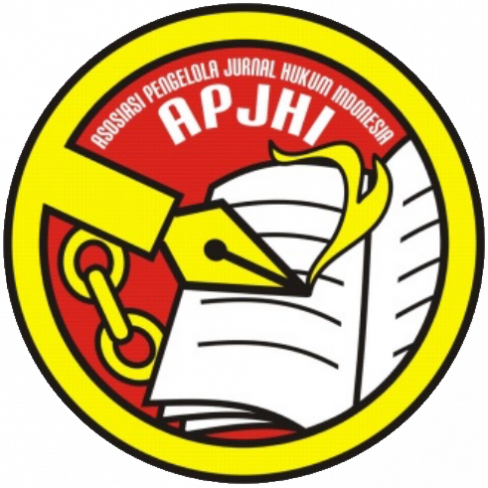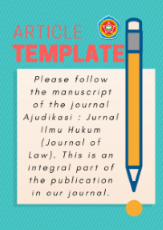Urgensi Pelaporan Gratifikasi dan Konsekuensi Hukum bagi Penyelenggara Negara
DOI:
https://doi.org/10.30656/ajudikasi.v8i1.8738Keywords:
Gratification, Reporting, Consequences, AdministratorsAbstract
The practice of gratification is for the Indonesian people a natural and natural tradition, but if the gift has a power relationship related to the duties and positions of the recipient, the meaning of the gift is no longer considered normal and leads to corrupt behavior. This writing aims to determine the criteria for gratification offenses that are considered bribes and determine the implications of gratification reporting. This research using normatif approach by identification regulation of gratification, technic collection data using library research by qualitative analysis. Gratification is considered corruption if it is given in connection with the recipient's duties and authority as a state administrator and is not reported to the Corruption Eradication Commission. The legal consequences of reporting gratuities for civil servants are that they are free from criminal threats, free from conflicts of interest, reflect high integrity, and are a means of self-evaluation.
Downloads
References
Buku:
Adrian Sutedi, S H. Hukum Keuangan Negara. Sinar Grafika, 2022.
Alatas, Hussein. “Korupsi: Sifat, Sebab Dan Fungsi.†(No Title), 1987.
Bureni, Imelda F K. “Kekosongan Hukum Perampasan Aset Tanpa Pemidanaan Dalam Undang-Undang Tindak Pidana Korupsi.†Masalah-Masalah Hukum 45, no. 4 (2016).
Djaja, Ermansjah. “Meredesain Pengadilan Tindak Pidana Korupsi–Implikasi Putusan Mahkamah Konstitusi Nomor 012-016-019.†PPU-IV/2006. Jakarta: Sinar Grafika, 2010.
Easter, Laola. Kriminalisasi Pasal Gratifikasi. Malang: Intra Publishing, 3AD.
Jursa, Eka. Kebijakan Penerapan Sanksi Hukum Pidana Dalam Menanggulangi Tindak Pidana Korupsi. Fakultas Hukum Unisba, 2013.
Sambas, Nandang, and Ade Mahmud. “Perkembangan Hukum Pidana Dan Asas-Asas Dalam RKUHP.†Refika Aditama, Bandung, 2019.
Setiadi, Edi, and Rena Yulia. “Hukum Pidana Ekonomi.†Yogyakarta: Graha Ilmu, 2010.
Sonatra, Pandji Ndaru, Widodo Tresno Novianto, and Agus Riewanto. “Konstruksi Pengawasan Independen Untuk Mencegah Tindak Pidana Pungutan Liar Dalam Pelayanan Publik.†Masalah-Masalah Hukum 48, no. 1 (2019).
Tuka, Sepriyanto Thobias. “Tidak Dibayarnya Uang Pengganti Oleh Terdakwa Tindak Pidana Korupsi Di Pengadilan Tipikor Kupang,†2017.
Jurnal:
Akadol, Jamiat. “Budaya Hukum Sebagai Faktor Pendorong Terwujudnya Reformasi Birokrasi Daerah Di Indonesia.†Jurnal Magister Hukum Udayana (Udayana Master Law Journal) 7, no. 1 (2018).
Gareda, Markhy S. “Perbuatan Menghalangi Proses Peradilan Tindak Pidana Korupsi Berdasarkan Pasal 21 UU No. 31 Tahun 1999 Juncto UU No. 20 Tahun 2001.†Lex Crimen 4, no. 1 (2015).
Gubali, Agustina. “Analisis Pengaturan Gratifikasi Menurut Undang-Undang Di Indonesia.†Lex Crimen 2, no. 4 (2013).
Mapuasari, Supeni Anggraeni, and Hadi Mahmudah. “Korupsi Berjamaah: Konsensus Sosial Atas Gratifikasi Dan Suap.†Integritas: Jurnal Antikorupsi 4, no. 2 (2018).
Masyhudi, Masyhudi. “Membangun Sistem Integritas Untuk Pemberantasan Korupsi Dalam Sistem Peradilan Pidana Indonesia.†Jurnal Hukum Ius Quia Iustum 26, no. 1 (2019).
Noviyanti, Rahma, Elwi Danil, and Yoserwan Yoserwan. “Penerapan Perma Nomor 5 Tahun 2014 Tentang Pidana Tambahan Uang Pengganti Dalam Tindak Pidana Korupsi.†Jurnal Wawasan Yuridika 3, no. 1 (2019).
Sahlan, Mohammad. “Kewenangan Peradilan Tipikor Pasca Berlakunya Undang-Undang Administrasi Pemerintahan.†Arena Hukum 9, no. 2 (2016).
Sosiawan, Ulang Mangun. “De Jure.†Jurnal Penelitian Hukum De Jure 19, no. 4 (2019).
Wibowo, Richo A, Mailinda E Yuniza, Rizky S Widyaningtyas, and Hendry Julian Noor. “Wacana Pemerintah Untuk Mereposisi Kelembagaan Inspektorat: Tindak Lanjut, Tanggapan, Serta Inisiasi Kedepan.†Jurnal Hukum & Pembangunan 48, no. 4 (2018).
Internet :
Fatmawati, Nur Indah. “Selain Suap Bupati Mojokerto Menjadi Tersangka Gratifikasi,†n.d. https://news.detik.com/berita/d-3998520/selain-suap-bupati-mojokerto-jadi-tersangka-kasus-gratifikasi.
Inspektorat Provinsi Jawa Barat. “Tanya Jawab Gratifikasi,†n.d. http://inspektorat.jabarprov.go.id/tanya-jawab-gratifikasi/.
Prasetyo, Aji. “Bolehkah Pemberi Gratifikasi Menjadi Tersangka Suap?,†n.d. https://www.hukumonline.com/berita/baca/lt5c6bdafb94f24/bolehkah-pemberi-gratifikasi-menjadi-tersangka-suap-kasus-ini-jadi-contohnya.
Lainnya
Korupsi, Komisi Pemberantasan. Pedoman Pengendalian Gratifikasi, 2015.
Downloads
Published
Issue
Section
License
Authors who publish with this journal agree to the following terms:
Authors retain copyright and grant the journal right of first publication with the work simultaneously licensed under a Creative Commons Attribution License that allows others to share the work with an acknowledgment of the work's authorship and initial publication in this journal.
Authors can enter into separate, additional contractual arrangements for the non-exclusive distribution of the journal's published version of the work (e.g., post it to an institutional repository or publish it in a book) with an acknowledgment of its initial publication in this journal.
Authors are permitted and encouraged to post their work online (e.g., in institutional repositories or on their website) before and during the submission process, as it can lead to productive exchanges and earlier and greater citation of published work.
All articles in Ajudikasi : Jurnal Ilmu Hukum can be disseminated provided they include the identity of the article and the source of the article (Ajudikasi : Jurnal Ilmu Hukum). The publisher is not responsible for the contents of the article. The content of the article is the sole responsibility of the author
Ajudikasi : Jurnal Ilmu Hukum is lincensed under a Creative Commons Attribution-ShareAlike 4.0 International License.









1.png)
.png)
.png)





.png)
.png)
.png)
.png)





.png)







